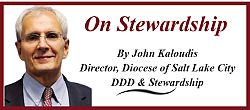A New Look at an Old Parable
Friday, Aug. 12, 2016
The 12th chapter of the Gospel of Luke speaks of two brothers fighting over their father’s inheritance. One of them tries to enlist Jesus to his side: “Tell my brother to divide the inheritance with me!”
Jesus refuses to get involved; he has the inheritance of eternal life on his mind, and he warns them: “Be on guard against all covetousness, for a person’s life is not in the abundance of his possessions.”
Then Jesus proceeds to tell a parable about a rich man who never enjoyed his wealth. Jesus doesn’t give him a name, but let’s call him Howard. Howard was a rich man who had barns and fields as far as the eye could see. He was also a frugal man, a good bookkeeper who knew where every penny went. He worked hard from the crack of dawn until late at night. Howard had no time to rest, to pray or to play. We would probably call Howard a “good steward” of his money: responsible, wise, pinching every penny.
In a stroke of good fortune from the hand of God, Howard’s land produced a bumper crop. Note that Jesus says, “The land produced plentifully.”
One might think Howard would be excited by this unexpected surplus. But not Howard: He is at the kitchen table late at night with his accountant on the phone and his broker online, trying to figure out what to do with all the extra grain.
St. Ambrose, commenting on this text, said that our rich friend Howard had plenty of storage space for his grain in the mouths of the poor.
Howard works out a plan: “I’ll tear down my barns and build larger ones,” and then retire in style. Notice the exclusive use of the pronoun my — my crops, my grain, my goods. Howard is totally blind to the hand of God working in his life.
And God says, “Howard, you idiot! Tonight I am going to pick you up in a hearse and all that grain in your backyard will be worthless to you. All the stuff you are so worried about is going to be tied up for years in probate, and whatever the government doesn’t get will be wasted by some distant relatives.”
Howard, rich beyond measure, dies alone. I am reading between the lines, but parables invite that. Jesus makes no mention of a wife or children or family or friends. The only people at his funeral likely were his tax accountant and his stockbroker.
Never once in his life did Howard enjoy his wealth. Never did he know the joy of giving. Never did he take the time to take a walk on the beach at sunset or lift his eyes to heaven. He was too busy gathering, storing, investing, wheeling and dealing.
Howard’s priorities weren’t wrong. Putting God first isn’t the answer. God isn’t first on a to-do list with all other idols second, third, and fourth. God is central. He is the source, the creative force that makes everything and holds everything in existence. So the grain, the grapes, the bread, the wine, the fields, the cattle, and all our goods are gifts. God is in the middle, central to all of it.
When we fail to recognize that God is in the center, we turn our stuff into gods, looking to them for identity. We don’t properly enjoy money is precisely because we turn money into some kind of religion. From the moment we first learn the power of money, we get religious. We have creeds about how to handle money: A penny saved is a penny earned. We have commandments concerning money: Don’t spend it all in one place. We have liturgies about money: daily stock market sessions. We treat money as though it were some kind of holy thing.
Money is in itself neutral, not bad. Money is a gift from God, like the grain Howard cultivated. It’s the love of money that is the root of all kinds of evil. The religion of money is what robs us of joy.
Faith in Jesus is the key to fulfillment in this life and the bridge to eternal life. I am not just talking about getting our doctrinal facts right about Jesus. Yes, he is true God and true Man, the second Person of the Undivided Trinity, begotten of the Father from eternity and born of the Virgin Mary. Yes, he suffered for our sins, died, and was buried and was raised to life on the third day. This is all true and of great importance.
The question is, do we believe it?
Our life is not our possessions, honors or accomplishments. When we are willing to abandon our life to God we will give generously and be rich toward him. Our offering should be about reckless abandon, radical trust. The best way to dismiss the religion of money is to give our idols away, not grudgingly but cheerfully. Those who are most generous in giving enjoy life the most.
For questions, comments or to report inaccuracies on the website, please CLICK HERE.
© Copyright 2024 The Diocese of Salt Lake City. All rights reserved.
© Copyright 2024 The Diocese of Salt Lake City. All rights reserved.


Stay Connected With Us